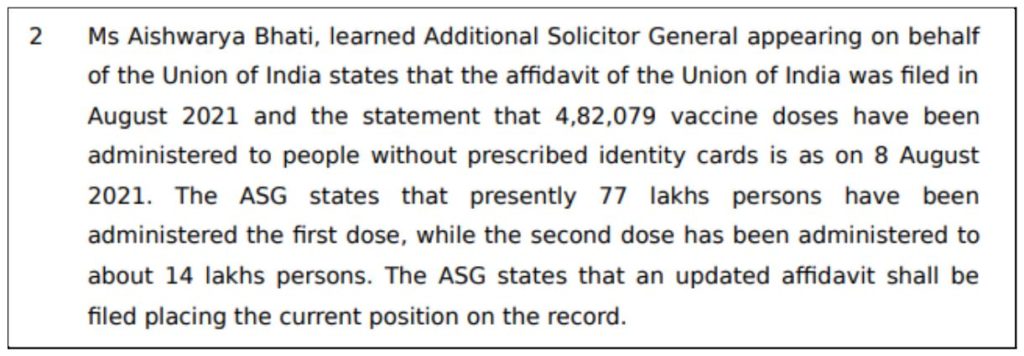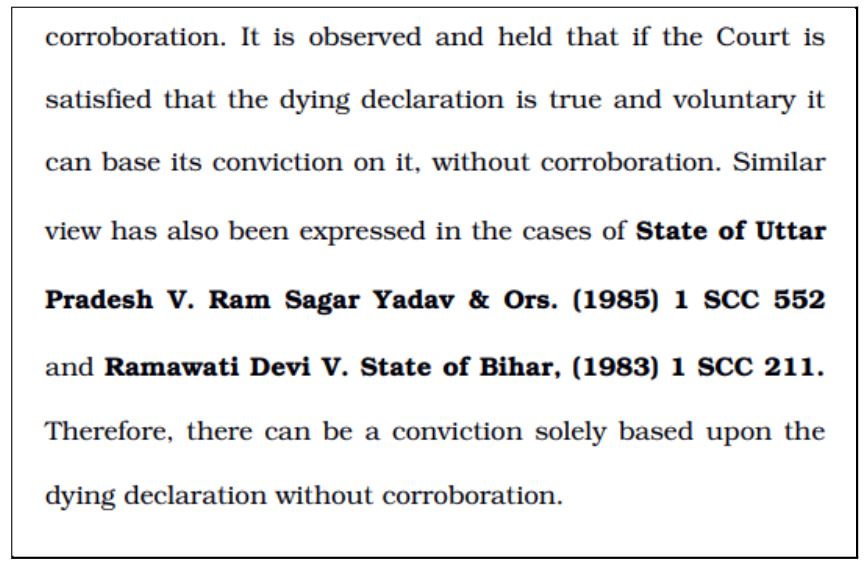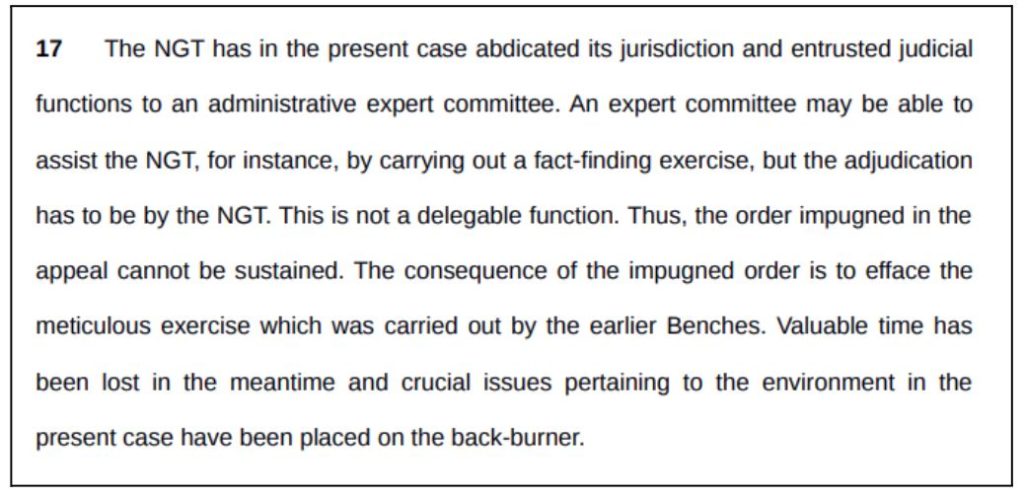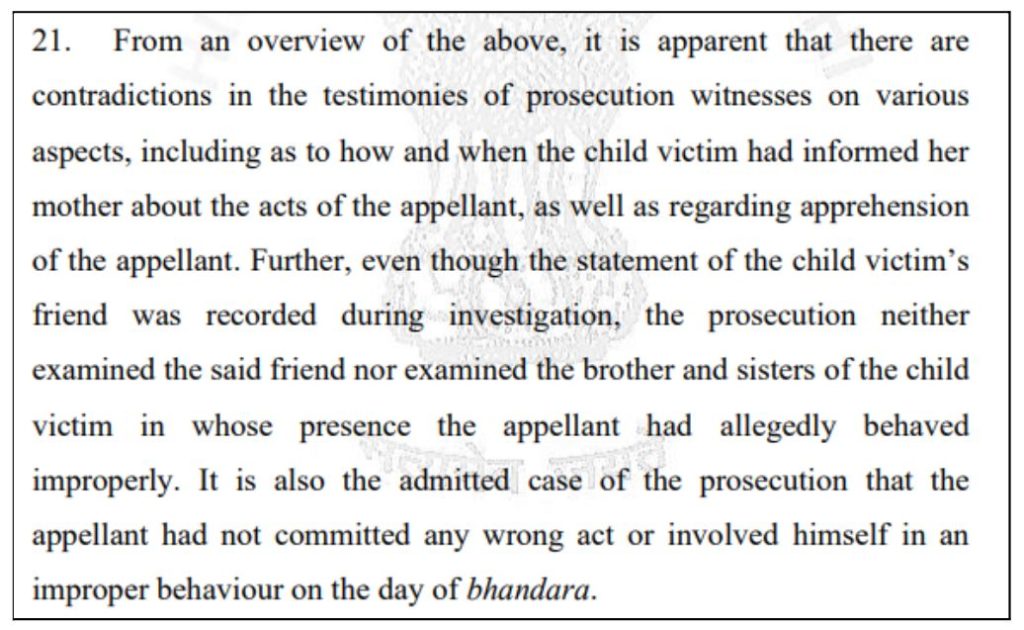In this roundup of Court Judgements, we look at the Supreme Court’s observations & directions on not rejecting COVID-19 compensation claims because they were filed online, a conviction can be solely based on dying declaration without corroboration if found to be true & voluntary, how fabrication of documents is an offence whether or not there is loss for Government, that adjudicatory functions of the NGT cannot be delegated to any administrative expert committees, etc.
SC: No state can reject an application on the ground that it was filed offline
In the case of Gaurav Kumar Bansal vs. Union of India monitoring the disbursal of ex-gratia compensation of Rs. 50,000 for COVID-19 death, the Supreme Court bench comprising of Justices M.R.Shah and B.V. Nagarathna directed all the State Governments to appoint a dedicated officer, not below the rank of Deputy Secretary in the Chief Minister’s Secretariat, as a nodal officer to coordinate with the Member Secretary of the State Legal Services Authority to ensure that all eligible claimants apply for ex-gratia compensation. Further, the bench noted that Maharashtra had rejected 61,848 applications out of over 2.27 lakh claims received because they were filed offline. It directed the State Governments to accept all applications whether filed online or not. The Apex Court stated that no application can be rejected on the ground that they were filed offline or on technical grounds. The Court has granted the State Governments one week’s time for reviewing the decision of rejecting claims filed offline.
Around the same time, the Rajasthan High Court observed that Black Fungus infections and its spread had not been stated to be of such a magnitude that it has been a pandemic and disposed the PIL filed seeking ex-gratia relief for Black Fungus victims like in the case of COVID-19 victims being provided by the government.
In a response to a plea made to ensure that beggars and vagabonds/homeless are also included in the COVID-19 vaccination program, the Centre told the Apex Court that 77 lakh persons without ID cards have been given the first dose and 14 lakh have been given both the doses. The plea will be heard again in March 2022.

SC: Conviction can be solely based on dying declaration without corroboration
In State of U.P. vs. Veerpal, a woman in Uttar Pradesh was allegedly set ablaze with kerosene by her father-in-law and mother-in-law. The incident took place in 2011 when the now-deceased had refused to give the in-laws some money that they demanded. A murder case was registered against the accused initially under Section 326 of IPC for voluntarily causing grievous hurt. The investigating officer after collecting relevant evidence and statements of witnesses filed a charge-sheet against the accused for murder under Section 302 read with Section 34. The Trial Court relied on the dying declaration recorded by the Magistrate and denied the accused’s argument that the deceased poured kerosene herself and sentenced both the accused to life imprisonment.
The case was later taken up in the High Court which acquitted the accused on grounds that there were two dying declarations- one recorded by the Inspection Officer on the day of the incident and the other recorded by the Magistrate after two days. The State then filed an appeal with the Apex Court against the High Court’s decision.
The Supreme Court Bench consisting of Justices MR Shah and BV Nagarathna noted that there was no reason to doubt the dying declaration recorded by the Magistrate wherein it was mentioned that the accused had set the victim on fire upon verification of medical evidence. It added that the reasoning of the High Court to not rely upon the dying declaration recorded by the Magistrate could not be accepted and restored the Trial Court’s verdict.
Citing past verdicts by the Supreme Court, the Bench noted that there was no rule of law or prudence to not accept a dying declaration without corroboration. It also went on to state that if the court is satisfied that the dying declaration is true and voluntary, it can base its conviction on it, without corroboration.

SC: Fabrication of documents is an offence whether or not there is a loss for Government
Missu Naseem & Anr. Vs. State of Andhra Pradesh & Ors. involved a land issue in which the State registered a criminal case alleging that the private respondents had submitted fake and fabricated tax books and tax receipts to the Urban Land Ceiling Department to grab Government land. The private respondents filed a petition before the High Court pleading to quash the FIR. The Andhra Pradesh High Court quashed the FIR stating that there was no revenue loss for the Government as it had collected the highest slab rate. Even if the petitioners had produced fabricated documents since there is no wrongful loss for the Government and so, registration of crime and carrying out the investigation would be an abuse of the process of law.
However, the Supreme Court held that the reasoning given by the High Court was totally unsustainable. The bench of Justices SK Kaul and MM Sundresh stated that the production of fake and fabricated documents was not permissible under any circumstances, even if the same did not cause any wrongful loss to the Government and set aside the AP High Court’s order. It also expressed regret over the pendency of the issue at the Apex Court for almost 8 years.

SC: Entire service records should be considered to pass the order of premature retirement
In Central Industrial Security Force vs. HC (GD) Om Prakash, Head Constable Om Prakash was prematurely retired in 2011 as per the provisions of the CCS (Pension) Rules, 1972 and Fundamental Rights after completion of 30 years of service. Delhi High Court set aside the order of premature retirement stating that the promotion as Head Constable took place only in 2000 and so the penalties imposed prior to the year 2000 must be ignored while determining suitability to be retained in service. It noted that the petitioner was awarded punishment multiple times prior to promotion for receiving illegal gratification, allegations of absence from duty and overstaying of leave. Furthermore, it was stated that the Annual Confidential Report (ACR) for 2010 was graded average and the writ petitioner was unaware of it because of which the ACR cannot be considered.
The SC bench comprising Justices Hemant Gupta and V. Ramasubramanian when hearing the appeal noted that an order of compulsory retirement is not an order of punishment. It referred to its earlier decisions and stated that the courts should not interfere with the exercise of the power of compulsory retirement if arrived at bonafidely and based on material available on record. The Bench said that the High Court had completely misdirected itself while setting aside the order of premature retirement and reversed the High Court’s order adding that a compulsory retirement order was not liable to be quashed by the court merely because adverse remarks considered were not communicated to the employee. In the order, the Bench also stated that the entire service record should be taken into consideration, even prior to promotion.

SC: Adjudicatory functions of the NGT cannot be delegated to any administrative expert committees
The case Kantha Vibhag Yuva Koli Samaj Parivartan Trust vs. State of Gujarat involved the issue of the dumping of unsegregated and untreated Municipal Solid Waste at an open landfill site in the district of Surat, which was raised by environmental organizations with the National Green Tribunal in 2014. Many orders were passed in the Original Application (OA) from time to time. In 2018, when the Principal Bench of NGT took up the issue, the OA was disposed of on the ground that in another OA, the NGT had constituted Apex, Regional and State Level Committees to monitor the implementation of the Solid Waste Management Rules.
Before the Supreme Court, an appeal was filed asking whether the Principal Bench of the NGT is right to have directed the appellants to approach the Committees set up by it, instead of the proceedings in the OA. The Supreme Court Bench comprising Justices DY Chandrachud and Bela M. Trivedi observed that the adjudicatory functions of the NGT cannot be delegated to any administrative expert committees. The expert committee may or may not assist the NGT by carrying out the fact-finding exercises, but the adjudication must be carried out by the NGT.

SC: Conviction on the sole evidence of the child witness is permissible if the witness is found competent and the testimony is trustworthy
In Ravinder vs. State, a 10-year-old girl alleged that the accused subjected her to daily indecent behaviour by exposing his genitals at the child outside her house. When she informed her mother about the sexual abuse, her parents apprehended the accused at the street where they saw him and lodged an FIR against him. During the investigation, the child revealed that the accused used to abuse her friend as well. After completion of the investigation, charge sheet was filed under Sections 354/509 IPC and Section 12 of the POCSO Act. The Additional Sessions Judge charged the appellant under Section 12 of the POCSO Act, to which he pleaded not guilty. He then appealed with the Delhi High Court.
Justice Manoj Kumar Ohri noted that there were contradictions in the testimonies of prosecution witnesses on various aspects such as how and when the child victim informed her mother about the acts of the appellant. Citing discrepancies with respect to the examination of the witnesses, the High Court allowed the appeal and acquitted the appellant of charges framed against him.
However, relying on past cases, the Court noted that conviction on the sole evidence of the child witness is permissible if the witness is found competent and the testimony is trustworthy. It added that in cases involving the testimony of a child witness, a note of caution has been sounded time and again to the effect that the testimony must be evaluated more carefully. Further, it noted that evidence of the child witness and its credibility would depend upon the circumstances of each case. The only precaution that the court must bear in mind while assessing the evidence of a child witness is that the witness must be a reliable one.

Featured Image: Important Court Decisions


